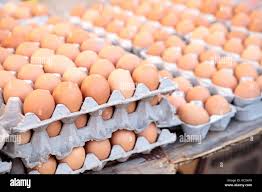
Egg producers lament declining sales and request government intervention.
The Poultry Farmers Association of Nigeria has expressed its concerns regarding the decreasing sales of eggs within the nation, attributing this trend to escalating economic difficulties and diminished purchasing power among the populace.
This statement was made by the Jigawa State chapter of the association, led by Mr. Hussaini Gumel, during a courtesy visit to Governor Umar Namadi at Government House Dutse, the state capital, on Thursday evening. Mr. Gumel remarked,
'Since the elimination of the fuel subsidy, our sector has suffered significantly. A considerable number of Nigerians can no longer afford eggs, leading to a sharp decline in our sales,'
linking the downturn to the growing economic challenges faced by many citizens. He further emphasized that the situation is worsened by the rising production costs, including feed and other essential inputs, stating, 'We are finding it increasingly difficult to sustain our businesses.'
The association’s members, comprising both men and women, face numerous challenges, particularly in accessing affordable poultry feeds. “It’s disheartening that chicken feeds are significantly cheaper in Jos, Plateau State, compared to Jigawa and many other states. This disparity has made it difficult for poultry farmers in Jigawa to maintain profitability,” Gumel lamented.
The current economic situation has further exacerbated the challenges, with many Nigerians struggling to afford chicken and eggs due to limited financial resources.
“There’s no market for our products, and the lack of sufficient money in circulation among people is alarming,” Mr. Gumel said, warning that the business is on the brink of collapse.
Decrying further, the chairman stated that “the poultry farmers also lack essential infrastructure, such as refrigerators and cooling devices, to preserve their products in the hot weather. “We’re appealing for government intervention to prevent losses due to damaged products,” Mr. Gumel urged, emphasizing the need for support to maintain the quality of their products.
He also highlighted the need for training and capacity-building programs, particularly for women involved in the poultry business, saying, “We need government support to facilitate training and empower our members, especially women at home who are engaged in poultry farming.”
To boost demand and support the industry, Gumel urged the government to consider including eggs in the school feeding scheme. “This would not only increase demand but also provide a stable market for our products, saving poultry business owners from collapsing,” he said, emphasizing the potential benefits for both the industry and the state’s economy.
Moreso, the chairman urged Namadi to consider providing support to egg producers in the state. “We need government intervention to cushion the effects of these economic hardships,” he said.
However, Gumel stressed the importance of the poultry industry to the state’s economy, noting that it provides employment and income for many residents. “We need government support to keep our businesses running,” he said.
The association’s leader also called for policies that would promote the growth of the poultry industry and promised to work closely with the government to identify areas where support is needed most. “We’ll provide necessary data and insights to inform policy decisions,” Gumel said.
Responding, the governor assured the poultry farmers of his administration’s support, promising to look into the challenges facing the industry, saying, “We’ll work together to find solutions.”
“I understand the challenges you’re facing, and I’m committed to supporting the poultry industry in Jigawa State. We’ll work together to identify solutions to the feed scarcity issue and explore ways to make it more affordable for your businesses,” he noted.
The governor, therefore, acknowledged the importance of the poultry industry to the state’s economy and promised to consider the association’s requests. “Your industry provides employment and income for many residents, and we must support its growth,” he said.
Namadi also expressed interest in exploring innovative solutions to support the industry, including potential partnerships with private sector stakeholders, assuring the poultry farmers that “We’ll look into providing training and capacity-building programs for your members, especially women, to enhance their skills and productivity.”
Our correspondent reports that the egg producers’ plea comes as many Nigerians struggle to cope with the economic challenges posed since the removal of fuel subsidy in 2023, as the move has led to increased prices of goods and services, further squeezing the purchasing power of many citizens.





